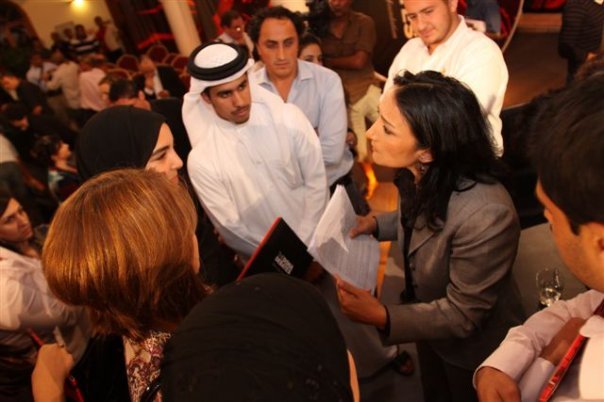Photo of author Asra Nomani at the Doha Debates, from the Washington Post article
Writing in the Washington Post, Asra Q. Nomani and Hala Arafa, journalists who identify as liberal Muslim women, reject the idea of wearing a hijab in solidarity, citing their concerns regarding the hijab and their theological disagreement with head covering.
The two link hijab to conservative, male-dominated, aspects of Islam. From the article:
For us, as mainstream Muslim women, born in Egypt and India, the spectacle at the mosque was a painful joke and reminder of the well-financed effort by conservatives to dominate modern Muslim societies. This modern-day movement spreads an ideology of political Islam, called “Islamism,” enlisting unsuspecting well-intentioned do-gooders, while promoting the headscarf for women as a virtual “sixth pillar” of Islam, after the traditional “five pillars,” the shahada (or proclamation of faith), prayer, fasting, charity and pilgrimage. We reject this interpretation. We are not too sexy for our hair.
Nomani and Arafa mention the Muslim Reform Movement, a global network of leaders supporting the right of Muslim women to choose, advocating that Islam undergo a reform similar to Vatican II; prior to the 1965 reform, there was a requirement for Catholic women to cover their heads before entering churches.
The history of hijab–and the viral social network movement around wearing hijab in solidarity–is a surprising one; Nomani and Arafa write that the current trend was sparked by a company which sells hijabs and by a TV station with sexist views of women. Using the Koran and historical research, they explore the origin of the hijab, noting that modern usage is not in the Koran.
From the article:
The word hijab, or a derivative, appears only eight times in the Koran as an “obstacle” or “wall of separation” (7:46), a “curtain” (33:53), “hidden” (38:32), just a “wall of separation” (41:5, 42:52, 17:45), “hiding” (19:14) and “prevented” or “denied access to God” (83:15).
Not once is hijab used in the Koran used to mean “headscarf.” It most certainly never denotes any act of piety.
Would this make you think twice before donning a hijab in solidarity? What are other ways you can show your support for Muslims in the face of rising Islamophobia?

